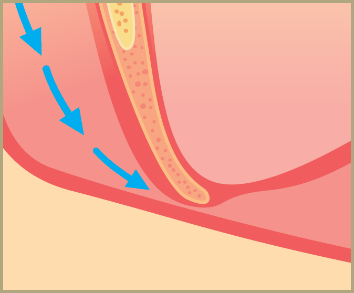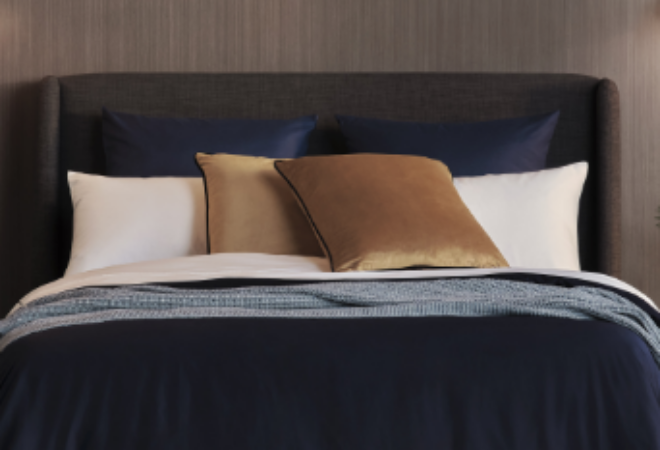CAUSES, REMEDIES AND SOLUTIONS
Snoring is often related to poor quality of sleep, and it can also impact your partner and others in the home as they try to sleep. For those wondering how to stop snoring, there are a number of easy-to-do lifestyle changes that help prevent or reduce snoring.

NORMAL

SNORING
What causes snoring?
To help stop snoring, it is important to consider what factors could be causing you to snore. Some common reasons for snoring include:
- Awkward sleeping positions
- Colds and allergies
- Smoking
- Excessive alcohol consumption
- Sedative use
- Throat muscle weakness
Best ways to stop snoring
Improving your sleep practices is a helpful method to help prevent snoring. Awkward or uncomfortable sleeping conditions can often be the cause of mild snoring. To help you get a better sleep and reduce snoring, you might like to consider:
TRY SLEEPING ON YOUR SIDE
Sleeping on your side is an effective way to help stop snoring as it can help keep your airways open while you sleep. Try sleeping in a lateral position to keep the airways more stable and reduce the occurrence of restricted airflow that causes snoring. If sleeping on your side feels unnatural, then read through our guide on how to fall asleep quickly for tips and tricks on how to get your mind and body comfortable before sleep.
USE A COMFORTABLE BED
Having a comfortable bed that supports you is key to preventing awkward sleeping positions, which can lead to snoring. The perfect bed means something different for everyone, so we suggest visiting our Bed Selector to help find the best mattress for you.
CHANGING PILLOWS AND BEDDING
Pillows and bedding can gather dust and pathogens that can lead to allergies and throat irritations. An irritated throat can swell and close up, making it more likely for you to snore. For this reason, it is important to wash bedding regularly to ensure a hygienic and clean sleep surface. You should also be cleaning your mattress approximately every six months to reduce build up of dust and pathogens. Read our mattress cleaning and care guide for more information.
CONSIDER ALTERNATIVES TO AIR CONDITIONING
Air conditioning dries out the air and the membranes in the nose and mouth, which can cause snoring. If you suspect that your air conditioning could be related to snoring, consider alternative cooling such as a ceiling fan or offsetting the effects of the AC with an air humidifier.
AVOID SMOKING AND DRINKING ALCOHOL BEFORE BED
Drinking alcohol and smoking relaxes your muscles, which includes those at the back of the throat. These relaxed throat muscles can cause blockages in your airways, making it more difficult for air to pass in and out of your lungs. This causes your body to forcefully suck in air, which in turn results in snoring.
The best mattress for snoring
We believe that a comfortable and supportive mattress is the best way to help stop snoring. The ideal bed is different for everyone; however, we have put together some tips to help select the best mattress for your needs.
SOFTER FEEL
A softer feel mattress might be more comfortable for side sleeping, which is recommended for snorers. A soft mattress can help make side sleeping easier as side sleepers tend to have more pressure points between their body and the mattress. Check out our Comfort Choice Guide for more information, so you can choose the right firmness level.
HIGH SUPPORT MATTRESS
A supportive mattress can help stop someone from snoring. Sealy Posturepedic mattresses provide a high level of support for the entire body, especially the neck and head, which is particularly important for snorers. The support system is designed with orthopaedic and sleep scientists to properly cradle your body, relieve muscle tension, and align your body to its natural position.
ENOUGH SPACE
Ensure you have the right size mattress to comfortably accommodate yourself (and your partner). Uncomfortable sleeping positions can lead to snoring, so it’s important to have a bed that allows you to spread out in a comfortable position. Explore our Mattress Size Guide to understand more about mattress sizes and bed dimensions in New Zealand.
At Sealy New Zealand, we understand snoring can impact sleep quality. The first step to a restful sleep is to invest in a quality and supportive mattress, so you can avoid uncomfortable and awkward sleeping positions, which can result in snoring. For more information about the ideal bed for you, get in touch with the Sealy team or check out our Bed Selector.
FAQ
Most adults require 7-9 hours of sleep per night in order to be refreshed and rested for the next day. Whether you prefer 7, 8 or 9 hours is up to your body and your personal sleep needs. Consider how many hours make you feel the most well-rested.
Most adults require 7-9 hours of sleep per night in order to be refreshed and rested for the next day. Whether you prefer 7, 8 or 9 hours is up to your body and your personal sleep needs. Consider how many hours make you feel the most well-rested.
Most adults require 7-9 hours of sleep per night in order to be refreshed and rested for the next day. If you still feel tired beyond 7-9 hours of consistent, undisturbed sleep, you may like to consider talking to a healthcare professional.
Most adults require 7-9 hours of sleep per night in order to be refreshed and rested for the next day. If you still feel tired beyond 7-9 hours of consistent, undisturbed sleep, you may like to consider talking to a healthcare professional.
An occasional nap is a great way to feel refreshed, especially if you feel very tired. It is best to try to avoid napping too often or too late in the day, as this may disturb you normal sleep patterns.
While the amount of sleep you may need varies depending on age and lifestyle, most adults require 7-9 hours of sleep per night to feel refreshed and well-rested. It is best to try and achieve good regular sleep to stay on top of your health and well-being.
While the amount of sleep you may need varies depending on age and lifestyle, most adults require 7-9 hours of sleep per night to feel refreshed and well-rested. It is best to try and achieve good regular sleep to stay on top of your health and well-being.
While the amount of sleep you may need varies depending on age and lifestyle, most adults require 7-9 hours of sleep per night to feel refreshed and well-rested. It is best to try and achieve good regular sleep to stay on top of your health and well-being.
Simply answer a few quick questions and we’ll recommend the best mattress for your sleep profile. We can also send you a customised report, which you can take into a local Sealy stockist so you can experience your recommended bed.




